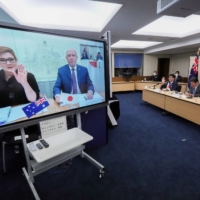Japan and Australia affirmed Wednesday the importance of peace and stability across the Taiwan Strait while agreeing to deepen bilateral security cooperation amid China’s rising assertiveness in regional waters.
The move followed similar calls for peaceful resolution of cross-strait issues during Japan’s recent summit talks with the United States and the European Union.
Tokyo and Canberra also confirmed at the virtual security talks that the Self-Defense Forces will protect Australian military assets in noncombat situations, Defense Minister Nobuo Kishi said.
In a joint statement issued after the ninth “two-plus-two” bilateral talks, Japan and Australia’s foreign and defense ministers said for the first time they “underscore the importance of peace and stability across the Taiwan Strait and encourage the peaceful resolution of cross-strait issues.”
China regards Taiwan, a democratic, self-ruled island, as a renegade province to be reunited with the mainland by force if necessary.
Kishi and Foreign Minister Toshimitsu Motegi said they also shared with their Australian counterparts — Marise Payne and Peter Dutton — concerns over a recently enacted Chinese law that enables its coast guard ships to fire on foreign vessels in waters that Beijing deems its territory.
Kishi told reporters following the online talks that Japan and Australia need to “further deepen security cooperation” so that they can “proactively contribute to the peace and stability of the Indo-Pacific region.”
As for the SDF protection of Australian military assets, Canberra became the second country, after the United States, whose assets Tokyo is allowed to protect under Japanese security legislation that came into force in 2016.
The law stipulates that SDF personnel are permitted to protect the military assets of other countries on the condition that the foreign forces are engaged in activities contributing to the defense of Japan. Kishi said the protection would be provided upon request from Australia.
The two countries had been coordinating the addition of Australia following an accord during their defense ministers’ talks last October as part of efforts to strengthen vigilance and surveillance activities amid China’s rise.
Kishi said the SDF would provide protection when Australia is gathering information on ballistic missiles, holding joint drills to improve its defense capability for Japan and engaged in transportation and supply activities during a crisis that could greatly affect Japan’s security.
The SDF’s overseas activities are strictly limited under the country’s war-renouncing Constitution.
At the talks, the four ministers also agreed that they will aim for an early conclusion of a bilateral pact aimed at facilitating joint exercises between their troops, Motegi said.
In November last year, Prime Minister Yoshihide Suga and Australian leader Scott Morrison agreed in principle on the pact, formally called “Reciprocal Access Agreement.”
The four ministers also voiced “serious concerns” over reports of human rights abuses against Uyghur and other Muslim minorities in China’s far western region of Xinjiang, but Beijing dismissed the remarks as a malicious smear.
Calls have grown from some Western nations to investigate if China’s actions in Xinjiang amount to genocide, as the United States and parliaments in nations such as Britain and Canada have described China’s policies there.
“We share serious concerns about reported human rights abuses against Uyghur and other Muslim minorities in Xinjiang,” Japan and Australia said in a joint statement after a meeting.
“We call on China to grant urgent, meaningful and unfettered access to Xinjiang for independent international observers, including the U.N. High Commissioner for Human Rights,” it said.
In Beijing, the Foreign Ministry said it strongly objected to the two nations playing up the “China threat” and smearing the country maliciously.
China urged all sides to stop interfering in its internal affairs, and to stop sabotaging regional peace and stability, ministry spokesman Wang Wenbin told a regular news briefing.
In a time of both misinformation and too much information, quality journalism is more crucial than ever.
By subscribing, you can help us get the story right.
SUBSCRIBE NOW



